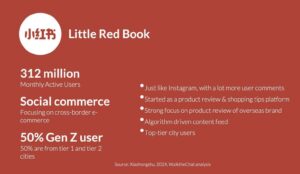Edouard de Mézerac, Artefact APAC CEO, reveals what’s behind the curtain on Little Red Book, aka Xiaohongshu, China’s social media channel. The app, simply called Red by its users, has become one of the hottest social platforms in China.
Founded in 2013 originally as a cross-border shopping hub, the Shanghai-based platform has evolved into a vital part of the Chinese social media landscape, with over 300 million monthly active users. With over 80 million community sharers and 90% user-generated content, the platform’s unique blend of social media and e-commerce is designed to inspire lives by enabling users to share experiences through images, video and text.

Finding the path to monetization
Founded with a vision to create a space for user-generated content, Little Red Book experimented with various business models before finding its niche. Early attempts at mass media monetization and cross-border shopping didn’t yield the desired results. The turning point came when the platform recognized the intrinsic value of quality user-generated content. The more organic the content, the more engagement it garnered from users.
This shift in strategy led to the development of a self-contained e-commerce ecosystem within the platform. Initially, Little Red Book directed users to external sites like Tmall for purchases. However, by October 2023, the platform had established a closed-loop, self-operated e-commerce system. This change allowed Little Red Book to offer a seamless experience where users could discover, engage with, and purchase products, all within the same environment.
User-generated content is key
Little Red Book’s user base has grown to an impressive 300 million monthly active users. Interestingly, 70% of these users are female, a demographic distribution that sets it apart from other major Chinese platforms like JD.com, which skews more male, and the more balanced Ali. This predominantly female user base has shaped the platform’s content and commerce strategies, making it a preferred destination for fashion, beauty, and lifestyle content.
The platform’s emphasis on high-quality, user-generated content has also fostered a unique engagement model. Unlike TikTok (Douyin in China), which relies heavily on AI to bombard users with targeted content in a continuous flow, Little Red Book’s AI algorithms help users discover relevant content based on their searches and interactions rather than overwhelming them with endless suggestions.
How GenAI grows Little Red Book
GenAI has become a crucial tool for brands operating on Little Red Book. Instead of simply investing large sums to increase visibility, brands use GenAI to create and customize content that resonates with users. This approach helps brands cultivate the right content to grow organically within the platform’s ecosystem, analyze what type of content performs well and what doesn’t, allowing them to fine-tune their strategies.
“Little Red Book is like a garden. You can’t just pour dozens of billions into a brand to gain more share. You need to help gardeners grow the right plants in that garden – and the right content.”Edouard de Mézerac, APAC CEO ARTEFACT / Data & AI
This AI-driven insight is essential for maintaining the delicate balance of authentic user-generated content that Little Red Book thrives on. By helping brands create content that users want to engage with, GenAI supports a more organic growth model, fostering a community-driven environment rather than a commercially dominated one.
It should be mentioned that Little Red Book is closely regulated by the Chinese government. This oversight ensures that the platform adheres to stringent content, data privacy, and cybersecurity regulations, impacting how it manages content and user interactions. The upside is that Little Red Book’s strong focus on content integrity has made it easier for users to know when they’re viewing authentic content – which is vital for Chinese consumers.

 BLOG
BLOG






